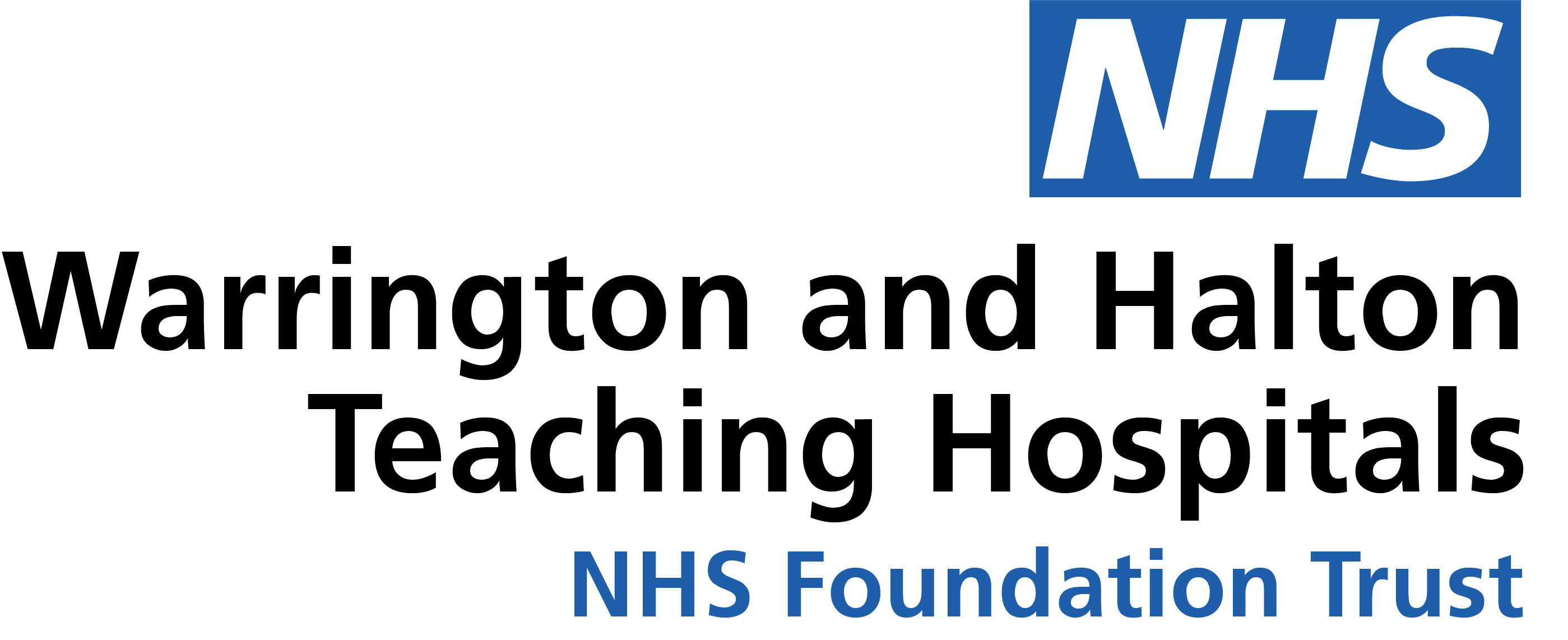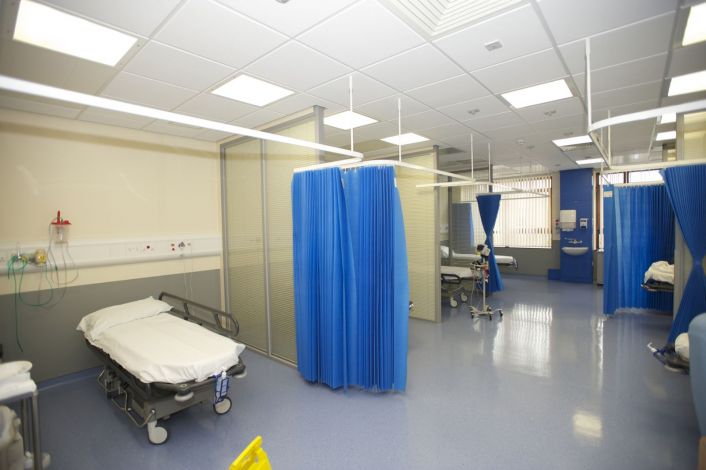Endoscopy services are delivered both on Warrington and Halton site. Both units JAG accredited units
Warrington Endoscopy is based on the first floor Appleton wing. The unit operates 3 endoscopy rooms with 26 GI lists, 2 ERCP and 2 bronchoscopy/EBUS lists per week. There are 13 trolley spaces to recover patients segregated for males and females. One of the procedure rooms is designed for X- ray screening. This unit provides both inpatient and outpatient endoscopy service. This unit provides ranges of diagnostic and therapeutic procedures to include:
- Diagnostic and therapeutic Gastroscopy
- Colonoscopy
- Flexible sigmoidoscopy
- Enteral tube insertions (PEG, NGT)
- Endoscopic Retrograde Cholangiography (ERCP)
- Polypectomy and Endoscopic Mucosal Resection (EMR)
- Oesophageal, pyloric and colonic Stent insertion
- Oesophageal Dilatations
- Bronchoscopy, EBUS
- EUS
Halton Endoscopy is based in the main corridor of the Nightingale Building on the first floor. The unit has 2 procedure rooms offering 20 GI sessions and sessions per week. This unit provides the following services
• Gastroscopy
• Colonoscopy
• Flexible sigmoidoscopy
• Polypectomy and Endoscopic Mucosal Resection (EMR)
• Oesophageal Dilatations
An endoscopy procedure involves using a flexible endoscope with a small camera on the end to look inside your body. The procedure investigates problems and looks for diseases, including cancer.
An endoscope is used to look inside the body; this is a long, thin, flexible tube with a light and camera at one end; images from inside the body are then displayed on a screen.
The endoscope can be used to both diagnose and treat conditions within the gastrointestinal tract. The use of endoscopes has progressed from solely diagnostic procedures, to also include therapeutic procedures which would have previously required surgery. Types of therapeutic procedures include; controlling gastrointestinal bleeding, dilation of strictures, palliation (Argon Plasma) and treatment of gastrointestinal malignancy.
Endoscopy procedures are usually performed as day cases and may use local anaesthesia to numb a specific area of the body, or conscious sedation. The use of endoscopic procedures instead of surgical procedures has many benefits, including; reducing risk of surgical complications and reducing hospital length of stay, therefore reducing risks of acquiring hospital infections.
You can find below some useful patient information leaflets to read:
- Upper GI Endoscopy
- Colonoscopy
- ERCP
- Flexible Sigmoidoscopy
- Inserting an Oesophageal Stent
- Upper GI Endoscopy and Dilatation
- Upper GI Endoscopy and Sigmoidoscopy
- Endoscopic Ultrasound
- Transnasal Endoscopy
Before
Depending on what part of your body is being examined, you may be asked to avoid eating and drinking for several hours beforehand. If you are having a colonoscopy or flexi-sigmoidoscopy you may also be given a laxative to help clear stools from your bowels in advance of the procedure.
If you are taking a medicine to thin your blood, such as warfarin, you may be asked to stop taking it for a few days before having your endoscopy. This is to prevent excessive bleeding during the procedure. However, do not stop taking any prescribed medicine unless your GP or specialist advises you to do so.
The procedure
An endoscopy is not usually painful, although it may feel uncomfortable. Endoscopies do not usually require general anaesthetic. However, you may be given a local anaesthetic to numb a specific area of your body. This may be in the form of a spray to numb your throat. You may also be offered a sedative which makes you feel more relaxed and less aware of what is going on around you.
The endoscope is carefully guided into your body. Exactly where it enters will depend on the part of your body being examined. This may include your:
• Throat
• Anus (the opening through which stools are passed out of the body)
Depending on the exact nature of the procedure and its objectives, an endoscopy can take 15-60 minutes to carry out. It will usually be performed on an outpatient basis, which means you will not have to stay in hospital overnight.
After
After having an endoscopy, you will probably need to rest for about an hour until the effects of the local anaesthetic and/or the sedative have worn off. You should not drive immediately after the procedure, so you will need to arrange transport to take you home.
We have a team made up of:
• Gastroenterology consultants
• Surgical Consultants
• Staff grade doctor
• Specialist colorectal nurses
• Specialist gastrointestinal nurses
• Nurse endoscopists
• Nurses
• Higher level nursing assistants
• Housekeeper
• Porter
The AIM OF an endoscopy facility is to provide high- quality diagnostic and therapeutic endoscopy services. We achieve this using a multidisciplinary approach. We provide a comfortable environment for patients that maintains both privacy and dignity. We comply with national guidance in caring for all who may require a procedure.
The aim of Warrington and Halton Teaching Hospitals NHS Foundation Trust is “To provide high quality patient and client focused services through well trained staff with high morale.”
The following five core values will underpin the organisational culture of Warrington and Halton Teaching Hospitals NHS Foundation Trust and have been developed to help us achieve our purpose.
- Working Together: We will work together to ensure patients come first and our staff feel valued
- Excellence: We will provide excellent care
- Embracing Change: We are always learning and improving for our patients, the public and each other
- Inclusive: We will be inclusive in all that we do so that our patients and staff can be their whole and authentic selves
- Kind: We will act with compassion, empathy and respect to relieve each person’s pain, distress, anxiety or need
The unit’s aim is to provide the highest standard of care for all our patients, regardless of age, ability, race, culture, religion and sexual orientation.
We will care for our patients and visitors, as we ourselves would wish to be treated.
Despite our patients’ short stay, we aim to meet their needs and, where necessary, will continue to care for them through the community nursing service.
An open attitude is encouraged in which information is shared with patients wherever possible, being mindful of the importance of patient confidentiality and the Data Protection Act. We will ensure the patient is treated in privacy and with dignity.
We believe in working together as a team. Supporting and respecting each other, we are aware that everyone’s contribution is of values to our overall performance.
The unit promotes and facilitates staff professional development. We welcome all comments and suggestions as we are constantly looking for ways to improve our service.
Endoscopy Unit - Warrington
Appleton Wing
1st Floor
Warrington Hospital
Warrington
Cheshire
WA5 1QG
Telephone1:
01925 662288
Endoscopy Unit -The Nightingale Building
Hospital Way
Runcorn
Cheshire
WA7 2DA
Telephone1:
01928 753182


